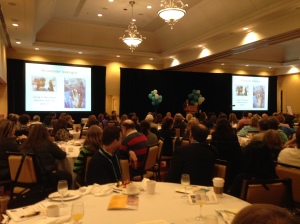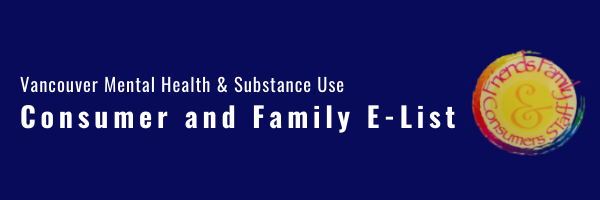
Greetings from the first Canadian National Conference on Peer Support

I’ve attended the first two days of the National Conference on Peer Support organized by Peer Support Accreditation and Certification Canada and am looking forward to day three tomorrow. I’ve been tweeting away about it but wanted to share my experiences on this page also since it feels like such a wonderful privilege to be here.
The keynote address on the first day was delivered by Patricia Deegan, a woman diagnosed with schizophrenia who went on to get a doctorate degree in psychology. She’s written a lot about recovery and I have been a fan for years. This was the first time I got to see her in person.
Her keynote address was called “Peer Staff: Disruptive Innovators”. I won’t attempt to summarize the entire talk, but one of the ways in which she said peer supporters are disruptive to traditional mental health cultures is by blurring the boundaries between health and sickness. Traditionally, in mental health, people saw the well treating the unwell. Peer Supporters challenge these silos and drive home the reality that everyone is really on a continuum.
After the keynote speech I went to a breakout talk that Deegan was delivering titled “Navigating the Dignity of Risk and the Duty to Care”. She talked about the challenge presented when a system that believes in choice and self-determination is confronted with someone making a choice that seems unwise. She gave a detailed example of a person on olanzapine with diabetes who persisted in drinking two litres of sugary Mountain Dew every day despite his team’s efforts to encourage healthier practices.
She talked about two extreme ends of a continuum that service provider responses can fall on. At one end is over protection. In this example, the team could respond by taking charge of the man’s money so that it would be harder for him to buy Mountain Dew. At the other end of the continuum is neglect. In this example, the team could say “Drinking the Mountain Dew is his choice. Let him live with the consequences.”
Deegan says that recovery oriented practice lies somewhere between the neglect and over-protect extremes of the continuum. She said the concepts that help us navigate the continuum are:
1. Duty to Care – we must remain engaged with people no matter what decisions they are making. We don’t walk away and say “Oh well, his choice”. We continue to explore the issue, offer options, talk about pros and cons, educate – do whatever we need to do to stay engaged. Also, we need to document it all so that we are comfortable with risk.
2. Dignity of Risk – this concept comes out of the broader disability rights movement. Deegan talked about how once you have a diagnosis, there is often a medicalization of your entire life and a sense that others need to protect and make choices for you. She noted that people without a diagnosis get to make poor choices and that overprotection stifles growth. It stifles the discovery of limits and potentiality. It’s a kind of toxic help that hurts in the long run.
Choices that seem unwise are hard to deal with but the Duty to Care and Dignity of Risk concepts are tools that can help us avoid extreme responses and be recovery oriented.
Those are some of the things I’ve found interesting at this conference. There have been many other things also but it’s 12:06 Halifax time and I’m thinking I better get to bed soon. There’s a keynote address by Romeo Dallaire at 9:00 am tomorrow which is 5:00 am Vancouver time. Pretty early morning! But I don’t want to miss it. One of the Peer Support Workers from Vancouver who has also come to the conference has been telling me all about how amazing Dallaire is so I want to be there when he speaks.
Good night all!
Renea Mohammed

